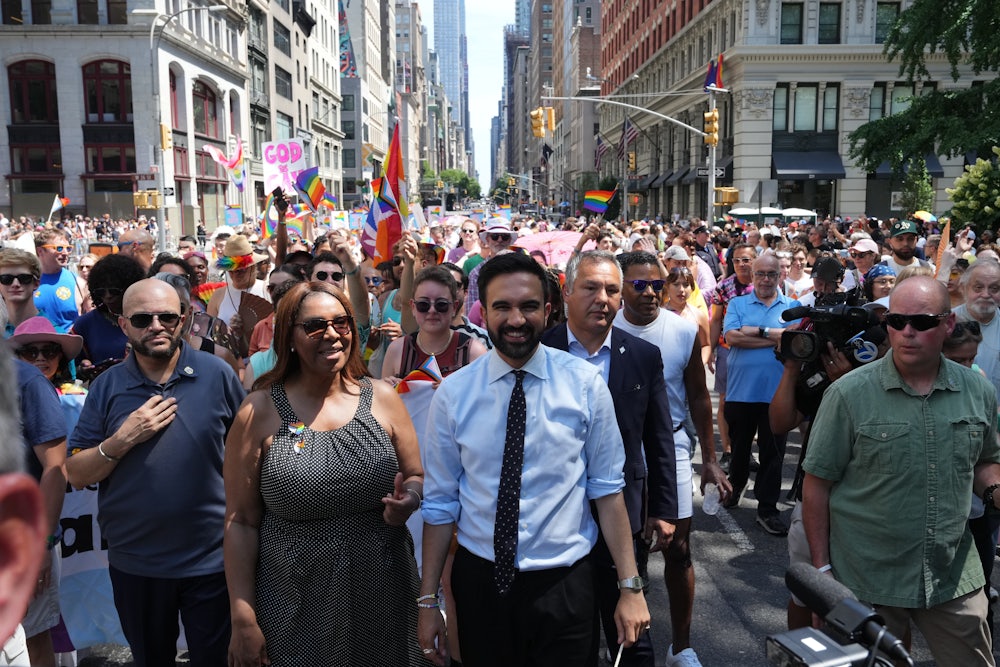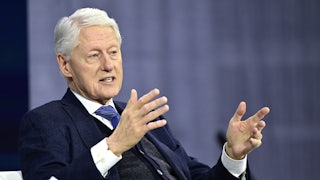I covered New York City politics for quite a few years in my younger days, but instead of instilling in me a continuing passion about the city, it generally left me feeling as if I’d paid that check, as it were. New York politics hasn’t interested me deeply for many years. This is partly because New York Democrats, once a mighty machine that set the direction for and helped transform the national Democratic Party, are a shadow of their old selves. The city once produced mayors who were, per the old cliché, larger than life. The last couple have been smaller than life.
So Zohran Mamdani is the first interesting thing to happen in New York City politics for a long time. He’s fresh, he’s energetic, and he has swagger. I’ve been thinking a lot about that last word—swagger—because the national Democrats have none of it whatsoever. They have anti-swagger. They’re as exciting as a knitting society. Mamdani makes for a breathtaking contrast with them collectively.
I have some reservations about Mamdani, the assemblyman who topped Andrew Cuomo among many others in last week’s Democratic primary for mayor. Questions about his lack of experience are entirely legitimate. I don’t know how large a staff he has; I did see another New York assemblyman’s website listing that that fellow has a staff of seven people. The mayor of New York runs a bureaucracy of more than 300,000. The mayor is also properly thought of as the CEO of several multibillion-dollar public corporations or trusts: one running housing, another schools, another colleges and universities, another hospitals, and a few (depending on how you categorize them) dispensing contracts and social services.
If Mamdani wins this fall’s general election—a contest that will include Mayor Eric Adams and possibly Cuomo, again—and becomes mayor, he’s going to need to appoint highly competent and knowledgeable (more than ideological) people to run these operations, and he’s going to have to be ruthless in ensuring that they do their jobs well. People see a mayor as the day-to-day manager of the city. Between now and November, Mamdani should be asked to speak in detail about these matters.
Then there’s the question of some of his rhetoric with regard to Israel-Palestine, most specifically around his refusal to renounce the phrase “globalize the intifada.” He said recently on a Bulwark podcast that to him, the phrase means “a desperate desire for equality and equal rights in standing up for Palestinian human rights.” OK. But given that both intifadas did entail violence by Palestinians (in the face, of course, of constant Israeli violence against Palestinians), others, in a city with 1.3 million Jews, might reasonably hear the phrase more darkly.
It’s not a mayor’s job to make foreign policy. It’s a mayor’s job, in a city with dozens of ethnic groups, to lead them all fairly, both in tangible terms—the awarding of community service contracts, which is a huge deal in New York—and rhetorical ones; to lower the temperature when things get hot through the force of his moral example. Mamdani has many prominent Jewish supporters. I’ve known Congressman Jerry Nadler and trusted his political judgment for 35 years, so when Nadler endorsed him, that got my attention. But Mamdani will need to go into Jewish neighborhoods between now and November and build some bridges.
And having said all that … it infuriates me to see centrist Democrats, including the party’s leaders in the House and Senate, keep their distance from him, or worse. The guy won (presumably—the official canvass is Tuesday). He did something absolutely stunning. He went from literally 1 percent to 43 percent. That never happens. When somebody pulls that off, people don’t need to be fretting about it or attacking it; they need to ask why and see what they can learn from it.
It didn’t happen because he denounces Israel. And it didn’t happen because New York Democratic voters are suddenly a bunch of Jeremy Corbyns. It happened because he focused aggressively and entertainingly on the only real issue, the issue that has a lot of perfectly normal people at the end of their ropes: the insane cost of living in New York.
And he didn’t just throw out a bunch of policies. He told voters a story that had good guys (everyone struggling to make ends meet) and bad guys (corporations and the overclass). He promised some things that will make their lives a little easier.
No, Mamdani probably can’t follow through on a lot of these things. He’ll need the governor and the state legislature to agree on a number of them, and that’s very unlikely. But let’s judge that if and when he becomes mayor. For now, let’s just consider how what he did worked.
He told some very simple truths. He said: You’re getting screwed. And it’s not some invisible and undefinable hand of God that’s screwing you. It’s specific actors, and the politicians who are their handmaidens. He told people something that they already knew—but that they too rarely hear politicians, even Democratic ones, say.
Right now in Washington, the Republicans are on their way to passing a bill that, as I wrote last Friday, will deposit $68,000 IRS checks into the bank accounts of people making more than $900,000 a year while it will cut billions of dollars in health care to Americans of few to moderate means.
At every public university in the country right now with an in-state network of hospitals, the higher-ups are in a panic wondering how they’re going to replace the many millions of dollars that are being picked out of their pockets—money that funds health care for those who can’t pay, mind you—and dropped into the wallets of millionaires.
The national Democrats talk about this at Capitol Hill press conferences and in cable news interviews. But they don’t seem to be able to tell a story about it for the life of them. Why is it so hard?
Democrats of all stripes, especially the centrist ones, need to think about this. Mamdani, like anyone, has flaws and shortcomings. But he has swagger. He’s unafraid—unafraid of the 1 percent and their wallets, unafraid of offending those people once in a while, unafraid of maybe making a mistake, unafraid of taking a punch. His positions by all appearances are what he actually believes, not what focus groups told him to believe.
He’s not exactly in-cautious. He wants to win, so he hedges some bets. But he absolutely is anti-cautious: against caution as a first reflex. National Democrats should take note.






